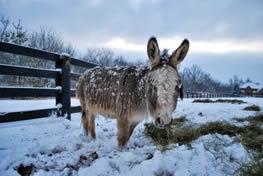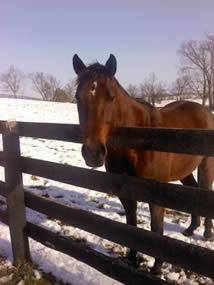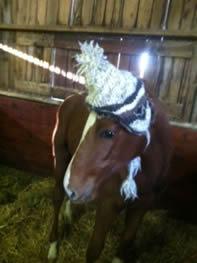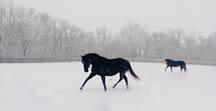With the winter weather quickly approaching and temperatures dropping, the colder weather can bring additional challenges to the daily management of your horse. Modifications to your horse’s care may be necessary to protect your horse from problems that arise.
This article is aimed at offering some helpful hints, tips and suggestions on making sure your horse remains healthy during frigid temperatures.
1. STAYING HYDRATED
Making sure your horse remains adequately hydrated is crucial during the cold, winter temperatures. Unfortunately, horses tend to drink less water during the wintertime. Also, horses are less interested in ice – cold water during the winter and their lack of physical activity during this time may diminish their drive to drink. Some easy management strategies to make sure your horse continues to drink water during the cold temperatures includes making sure their water source is readily available and unfrozen. There are a variety of products available to help keep your water sources defrosted. Keep in mind when using an electrical device that there is the possibility of causing a short, which could cause your horse to receive an electrical shock every time he goes to get a drink.
I have found great success with providing my horse with a bucket of warm water with a tablespoon of molasses added to it. Not only does he enjoy it, but it also entices him to drink. There are many other additives that you can include in your water source.
Horses appreciate and prefer warmer water temperatures during the winter months so if you notice that your horse isn’t drinking as much as he normally does, it wouldn’t be a bad idea to try to offer him access to warmer water and see if he drinks.
Another way to add more water into your horse’s dietis by providing a mash: adding some warm water to your bran or feed is another option.Don’t forget to make sure a salt source is available!
2. FEED FORAGE…AND LOTS OF IT!
As cold winter temperatures start coming in, pasture goes away. Grass is more water – rich than hay so the fact that horses are eating less pasture in the winter is another reason to make sure they stay hydrated. Making sure your horse has frequent access to hay is very important, not only to maintaining your horses body condition during the winter months but also in making sure your horses’ gut and intestinal motility remains active and healthy. With decreased water intake and decreased access to pasture, horses can develop colic.Impaction colic is a type of colic most commonly seen during the winter months. This type of colic can be caused by dehydration, the fact that horses are eating coarser forages, and a decrease in intestinal motility due to lack of constant access to pasture/grass.
Not only does access to good hay and forage promote gastrointestinal health, it’s also important for providing the additional energy your horse needs to stay warm. Remember: if you’re concerned about your horse’s weight during the winter months, consultwith your veterinarian to develop a proper feeding program.
3. KEEP YOUR HORSE ACTIVE
Keep your horse moving… With the cold winter temperatures, it’s understandable that your training/ exercise program may change, but keeping your horse active, even if it’s for 15 – 20 minutes a couple of times a week can offer huge benefits.
Decreased exercise can lead to a decrease in muscle tone and mass, decreased cardiovascular fitness and reduction in flexibility. Keeping your horse in work will allow them to return to fitness more quickly, engage them mentally, and preserve body condition.
Keep in mind that it may take longer to warm your horse up during the cold temps so make sure your warms ups and cool downs are of appropriate length.
4. BLANKETING & SHELTER
Some horses are better at handling inclement weather and temperatures than others. For this reason, the decision to blanket your horse is completely dependent on each individual horse. Age, body condition, winter coat quality, and shelter availability are all factors that may determine your decision to blanket your horse. If you do plan on blanketing, it is important to remember to periodically check under their blanket to assess body condition and check for any blanket rubs, sores or abrasions as well as to assess the condition of the blanket itself.
Access to shelter is also important, especially if your horse is turned out on pasture 24/7. Having a place to escape snowstorms, hail, sleet or rain will help your horse save energy to maintain his/ her temperatureand body condition.
5. CALL YOUR VETERINARIAN…
Cold temperatures can have a negative affect on your horse and hopefully the tips provided will help your horse’s transition into the winter months go more smoothly. It is important to keep your veterinarian involved, especially if you begin to notice any changes. Keeping your horse up to date on vaccines,deworming, dental health and farrier care prior to winter time are instrumental to keeping your horse healthy not only during the colder months, but throughout the year.
Consulting with your veterinarian and establishing a plan specifically tailored to your horse can help prevent any problems and help keep your horse healthy!
This article is aimed at offering some helpful hints, tips and suggestions on making sure your horse remains healthy during frigid temperatures.
1. STAYING HYDRATED
Making sure your horse remains adequately hydrated is crucial during the cold, winter temperatures. Unfortunately, horses tend to drink less water during the wintertime. Also, horses are less interested in ice – cold water during the winter and their lack of physical activity during this time may diminish their drive to drink. Some easy management strategies to make sure your horse continues to drink water during the cold temperatures includes making sure their water source is readily available and unfrozen. There are a variety of products available to help keep your water sources defrosted. Keep in mind when using an electrical device that there is the possibility of causing a short, which could cause your horse to receive an electrical shock every time he goes to get a drink.
I have found great success with providing my horse with a bucket of warm water with a tablespoon of molasses added to it. Not only does he enjoy it, but it also entices him to drink. There are many other additives that you can include in your water source.
Horses appreciate and prefer warmer water temperatures during the winter months so if you notice that your horse isn’t drinking as much as he normally does, it wouldn’t be a bad idea to try to offer him access to warmer water and see if he drinks.
Another way to add more water into your horse’s dietis by providing a mash: adding some warm water to your bran or feed is another option.Don’t forget to make sure a salt source is available!
2. FEED FORAGE…AND LOTS OF IT!
As cold winter temperatures start coming in, pasture goes away. Grass is more water – rich than hay so the fact that horses are eating less pasture in the winter is another reason to make sure they stay hydrated. Making sure your horse has frequent access to hay is very important, not only to maintaining your horses body condition during the winter months but also in making sure your horses’ gut and intestinal motility remains active and healthy. With decreased water intake and decreased access to pasture, horses can develop colic.Impaction colic is a type of colic most commonly seen during the winter months. This type of colic can be caused by dehydration, the fact that horses are eating coarser forages, and a decrease in intestinal motility due to lack of constant access to pasture/grass.
Not only does access to good hay and forage promote gastrointestinal health, it’s also important for providing the additional energy your horse needs to stay warm. Remember: if you’re concerned about your horse’s weight during the winter months, consultwith your veterinarian to develop a proper feeding program.
3. KEEP YOUR HORSE ACTIVE
Keep your horse moving… With the cold winter temperatures, it’s understandable that your training/ exercise program may change, but keeping your horse active, even if it’s for 15 – 20 minutes a couple of times a week can offer huge benefits.
Decreased exercise can lead to a decrease in muscle tone and mass, decreased cardiovascular fitness and reduction in flexibility. Keeping your horse in work will allow them to return to fitness more quickly, engage them mentally, and preserve body condition.
Keep in mind that it may take longer to warm your horse up during the cold temps so make sure your warms ups and cool downs are of appropriate length.
4. BLANKETING & SHELTER
Some horses are better at handling inclement weather and temperatures than others. For this reason, the decision to blanket your horse is completely dependent on each individual horse. Age, body condition, winter coat quality, and shelter availability are all factors that may determine your decision to blanket your horse. If you do plan on blanketing, it is important to remember to periodically check under their blanket to assess body condition and check for any blanket rubs, sores or abrasions as well as to assess the condition of the blanket itself.
Access to shelter is also important, especially if your horse is turned out on pasture 24/7. Having a place to escape snowstorms, hail, sleet or rain will help your horse save energy to maintain his/ her temperatureand body condition.
5. CALL YOUR VETERINARIAN…
Cold temperatures can have a negative affect on your horse and hopefully the tips provided will help your horse’s transition into the winter months go more smoothly. It is important to keep your veterinarian involved, especially if you begin to notice any changes. Keeping your horse up to date on vaccines,deworming, dental health and farrier care prior to winter time are instrumental to keeping your horse healthy not only during the colder months, but throughout the year.
Consulting with your veterinarian and establishing a plan specifically tailored to your horse can help prevent any problems and help keep your horse healthy!










